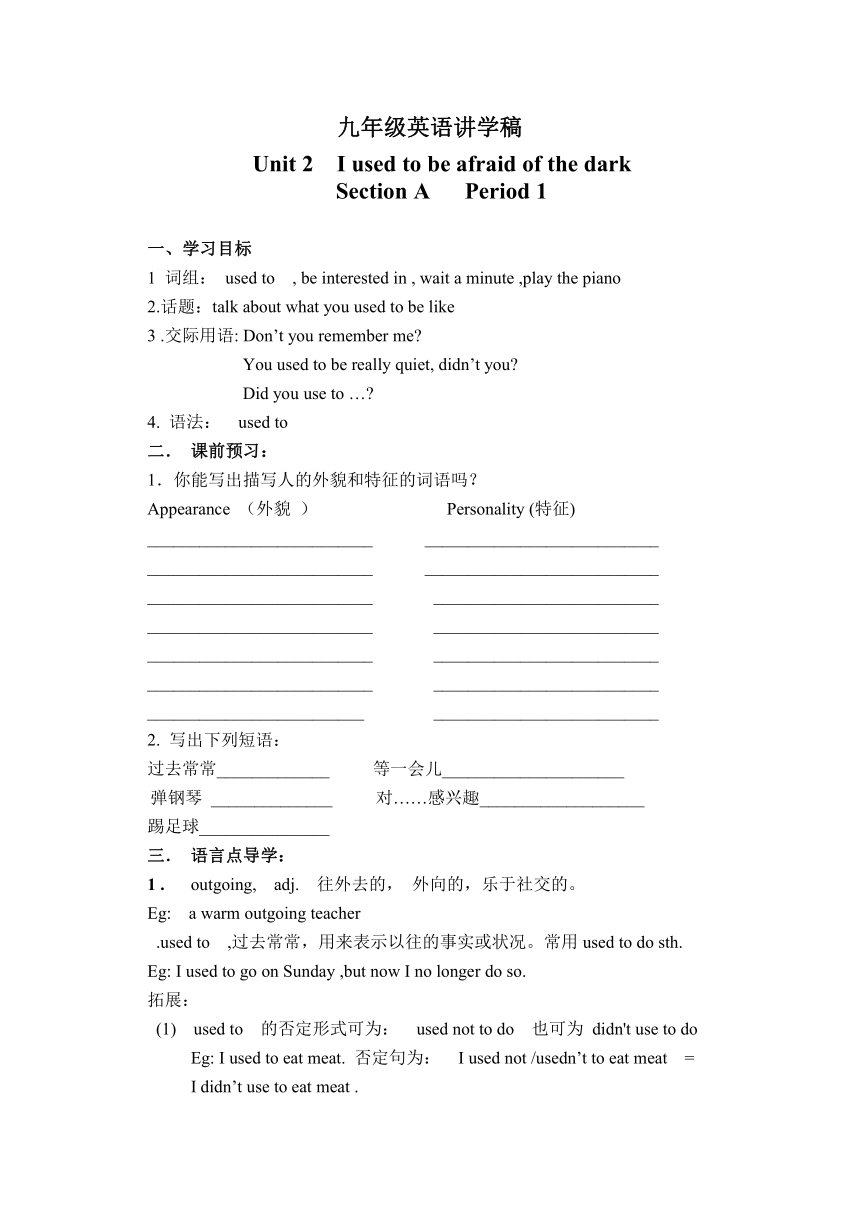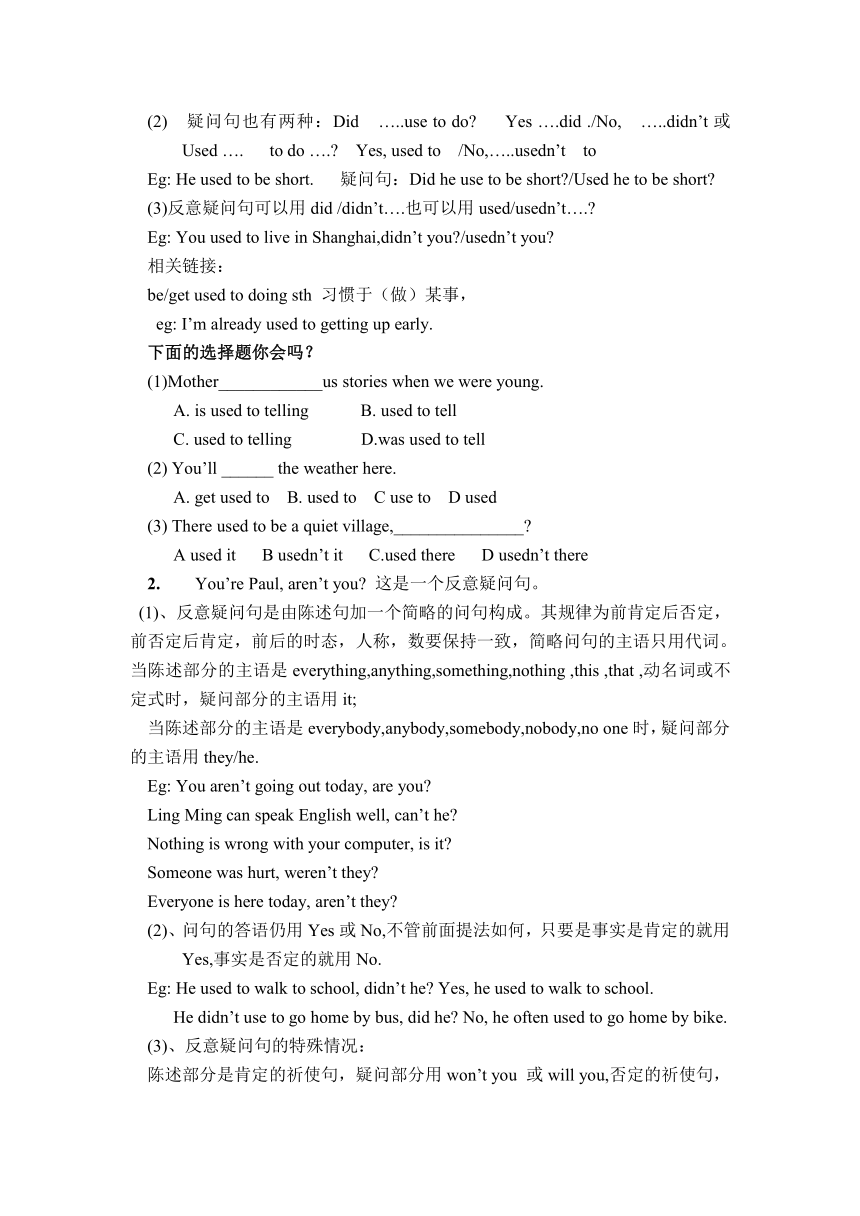Unit 2 I used to be afraid of the dark.(Section A Period 1)
文档属性
| 名称 | Unit 2 I used to be afraid of the dark.(Section A Period 1) |  | |
| 格式 | zip | ||
| 文件大小 | 14.8KB | ||
| 资源类型 | 教案 | ||
| 版本资源 | 人教新目标(Go for it)版 | ||
| 科目 | 英语 | ||
| 更新时间 | 2012-09-10 14:54:46 | ||
图片预览


文档简介
九年级英语讲学稿
Unit 2 I used to be afraid of the dark
Section A Period 1
一、学习目标
1 词组: used to , be interested in , wait a minute ,play the piano
2.话题:talk about what you used to be like
3 .交际用语: Don’t you remember me
You used to be really quiet, didn’t you
Did you use to …
4. 语法: used to
二. 课前预习:
1.你能写出描写人的外貌和特征的词语吗?
Appearance (外貌 ) Personality (特征)
__________________________ ___________________________
__________________________ ___________________________
__________________________ __________________________
__________________________ __________________________
__________________________ __________________________
__________________________ __________________________
_________________________ __________________________
2. 写出下列短语:
过去常常_____________ 等一会儿_____________________
弹钢琴 ______________ 对……感兴趣___________________
踢足球_______________
三. 语言点导学:
1 . outgoing, adj. 往外去的, 外向的,乐于社交的。
Eg: a warm outgoing teacher
.used to ,过去常常,用来表示以往的事实或状况。常用used to do sth.
Eg: I used to go on Sunday ,but now I no longer do so.
拓展:
(1) used to 的否定形式可为: used not to do 也可为 didn't use to do
Eg: I used to eat meat. 否定句为: I used not /usedn’t to eat meat =
I didn’t use to eat meat .
(2) 疑问句也有两种:Did …..use to do Yes ….did ./No, …..didn’t或Used …. to do …. Yes, used to /No,…..usedn’t to
Eg: He used to be short. 疑问句:Did he use to be short /Used he to be short
(3)反意疑问句可以用did /didn’t….也可以用used/usedn’t….
Eg: You used to live in Shanghai,didn’t you /usedn’t you
相关链接:
be/get used to doing sth 习惯于(做)某事,
eg: I’m already used to getting up early.
下面的选择题你会吗?
(1)Mother____________us stories when we were young.
A. is used to telling B. used to tell
C. used to telling D.was used to tell
(2) You’ll ______ the weather here.
A. get used to B. used to C use to D used
(3) There used to be a quiet village,_______________
A used it B usedn’t it C.used there D usedn’t there
2. You’re Paul, aren’t you 这是一个反意疑问句。
(1)、反意疑问句是由陈述句加一个简略的问句构成。其规律为前肯定后否定,前否定后肯定,前后的时态,人称,数要保持一致,简略问句的主语只用代词。当陈述部分的主语是everything,anything,something,nothing ,this ,that ,动名词或不定式时,疑问部分的主语用it;
当陈述部分的主语是everybody,anybody,somebody,nobody,no one时,疑问部分的主语用they/he.
Eg: You aren’t going out today, are you
Ling Ming can speak English well, can’t he
Nothing is wrong with your computer, is it
Someone was hurt, weren’t they
Everyone is here today, aren’t they
(2)、问句的答语仍用Yes或No,不管前面提法如何,只要是事实是肯定的就用Yes,事实是否定的就用No.
Eg: He used to walk to school, didn’t he Yes, he used to walk to school.
He didn’t use to go home by bus, did he No, he often used to go home by bike.
(3)、反意疑问句的特殊情况:
陈述部分是肯定的祈使句,疑问部分用won’t you 或will you,否定的祈使句,疑问部分只能用will you.
Eg: Open the window, won’t/will you
Don’t be late next time, will you
以let’s 开头的祈使句,疑问部分用 shall we
Eg: Let’s play soccer, shall we
句中含有 never ,few ,little , hardly ,no ,seldom ,nothing ,no one , nobody 等否定意义的词时,疑问部分用肯定形式。
Eg: Few people can do the work, can they
There is nobody in the room, is there
当I think/believe/suppose/guess的句子变反意疑问句时,疑问部分的人称,时态与宾语从句保持一致,同时也要考虑到否定转移。
Eg: I think he can swim, can’t he
I don’t think that he can work out the problem, can he
在反意疑问句中,当陈述部分是I’m….时,疑问部分用aren’t I
Eg; I’m your good friend ,aren’t I
3. be interested in sth /doing sth 对……感兴趣
Eg: I’m interested in collecting stamps.
相关链接:
(1) interest. n. 常用于下列短语中 take /have an interest in … 对……感兴趣 lose interest in = have no interest in 对……没兴趣
( 2 ) interesting 和 interested
interesting 有趣的,令人感兴趣的,做表语时,主语是物;也可作定语,修饰名词。
interesed 感兴趣的,主语是人。词组是 be /become interested in …
请你选出正确答案:
( ) Learning a foreign language is very ____ .What language are you ____ in
A interested, interesting B interesting, interesting C interesting, interested
4. I play soccer and I’m on the swim team .
play soccer 踢足球 play + 球类名词
Eg: play basketball /football
相关链接:
Play the piano /violin/guitar.
四.课堂练习
1 句型转换:
(1) He used to have long hair (改为一般疑问句)
_____ he _____ _____ have long hair
(2) Tom used to live in HK. (变反意疑问句)
Tom used to live in HK, _____ ______
(3) My brother used to swim in the pool.(变否定句) My brother ____ in the pool.
2 汉译英。
1)你过去常常下棋吗?
_____ you _____ ______ play chess
2) 我妈妈过去是一位英语教师。
My mother _____ _____ _____ an English teacher .
3) 人确实在变。 People _______ _________.
4) 我弟弟对游泳更感兴趣。
My brother is _____ ______ _______ _______ .
3. 用所给词的适当形式填空。
1) Tom used to _____ (get) up late.
2)The book is very ______ .All of us are _____ in it. (interest )
3)Be sure _____ (come ) early.
4 ) Jim _____ (use ) to be short , didn’t he
5) She is _______ (outgoing) than before.
4.选择。
( )1. I ______ swim when I was a child because there was no swimming pool here .
A didn’t used to B didn’t using to
C used not to D wasn’t used to
( ) 2. She used to ____ ice cream when she was a child.
A liked B liking C likes D like
( ) 3. Mario is afraid of ______ mistakes.
A made B to make C making D makes
( )4.I used to upstairs, but now I am used to downstairs. It’s
Cooler in summer days.
sleep, sleep. B.sleeping, sleeping. C. sleeping, sleep. D. sleep, sleeping.
( )5.-- you go to the movie yesterday – Yes, I .
A. Didn’t, didn’t. B.Don’t, do. C.Didn’t, did. D.Don’t, don’t
Unit 2 I used to be afraid of the dark
Section A Period 1
一、学习目标
1 词组: used to , be interested in , wait a minute ,play the piano
2.话题:talk about what you used to be like
3 .交际用语: Don’t you remember me
You used to be really quiet, didn’t you
Did you use to …
4. 语法: used to
二. 课前预习:
1.你能写出描写人的外貌和特征的词语吗?
Appearance (外貌 ) Personality (特征)
__________________________ ___________________________
__________________________ ___________________________
__________________________ __________________________
__________________________ __________________________
__________________________ __________________________
__________________________ __________________________
_________________________ __________________________
2. 写出下列短语:
过去常常_____________ 等一会儿_____________________
弹钢琴 ______________ 对……感兴趣___________________
踢足球_______________
三. 语言点导学:
1 . outgoing, adj. 往外去的, 外向的,乐于社交的。
Eg: a warm outgoing teacher
.used to ,过去常常,用来表示以往的事实或状况。常用used to do sth.
Eg: I used to go on Sunday ,but now I no longer do so.
拓展:
(1) used to 的否定形式可为: used not to do 也可为 didn't use to do
Eg: I used to eat meat. 否定句为: I used not /usedn’t to eat meat =
I didn’t use to eat meat .
(2) 疑问句也有两种:Did …..use to do Yes ….did ./No, …..didn’t或Used …. to do …. Yes, used to /No,…..usedn’t to
Eg: He used to be short. 疑问句:Did he use to be short /Used he to be short
(3)反意疑问句可以用did /didn’t….也可以用used/usedn’t….
Eg: You used to live in Shanghai,didn’t you /usedn’t you
相关链接:
be/get used to doing sth 习惯于(做)某事,
eg: I’m already used to getting up early.
下面的选择题你会吗?
(1)Mother____________us stories when we were young.
A. is used to telling B. used to tell
C. used to telling D.was used to tell
(2) You’ll ______ the weather here.
A. get used to B. used to C use to D used
(3) There used to be a quiet village,_______________
A used it B usedn’t it C.used there D usedn’t there
2. You’re Paul, aren’t you 这是一个反意疑问句。
(1)、反意疑问句是由陈述句加一个简略的问句构成。其规律为前肯定后否定,前否定后肯定,前后的时态,人称,数要保持一致,简略问句的主语只用代词。当陈述部分的主语是everything,anything,something,nothing ,this ,that ,动名词或不定式时,疑问部分的主语用it;
当陈述部分的主语是everybody,anybody,somebody,nobody,no one时,疑问部分的主语用they/he.
Eg: You aren’t going out today, are you
Ling Ming can speak English well, can’t he
Nothing is wrong with your computer, is it
Someone was hurt, weren’t they
Everyone is here today, aren’t they
(2)、问句的答语仍用Yes或No,不管前面提法如何,只要是事实是肯定的就用Yes,事实是否定的就用No.
Eg: He used to walk to school, didn’t he Yes, he used to walk to school.
He didn’t use to go home by bus, did he No, he often used to go home by bike.
(3)、反意疑问句的特殊情况:
陈述部分是肯定的祈使句,疑问部分用won’t you 或will you,否定的祈使句,疑问部分只能用will you.
Eg: Open the window, won’t/will you
Don’t be late next time, will you
以let’s 开头的祈使句,疑问部分用 shall we
Eg: Let’s play soccer, shall we
句中含有 never ,few ,little , hardly ,no ,seldom ,nothing ,no one , nobody 等否定意义的词时,疑问部分用肯定形式。
Eg: Few people can do the work, can they
There is nobody in the room, is there
当I think/believe/suppose/guess的句子变反意疑问句时,疑问部分的人称,时态与宾语从句保持一致,同时也要考虑到否定转移。
Eg: I think he can swim, can’t he
I don’t think that he can work out the problem, can he
在反意疑问句中,当陈述部分是I’m….时,疑问部分用aren’t I
Eg; I’m your good friend ,aren’t I
3. be interested in sth /doing sth 对……感兴趣
Eg: I’m interested in collecting stamps.
相关链接:
(1) interest. n. 常用于下列短语中 take /have an interest in … 对……感兴趣 lose interest in = have no interest in 对……没兴趣
( 2 ) interesting 和 interested
interesting 有趣的,令人感兴趣的,做表语时,主语是物;也可作定语,修饰名词。
interesed 感兴趣的,主语是人。词组是 be /become interested in …
请你选出正确答案:
( ) Learning a foreign language is very ____ .What language are you ____ in
A interested, interesting B interesting, interesting C interesting, interested
4. I play soccer and I’m on the swim team .
play soccer 踢足球 play + 球类名词
Eg: play basketball /football
相关链接:
Play the piano /violin/guitar.
四.课堂练习
1 句型转换:
(1) He used to have long hair (改为一般疑问句)
_____ he _____ _____ have long hair
(2) Tom used to live in HK. (变反意疑问句)
Tom used to live in HK, _____ ______
(3) My brother used to swim in the pool.(变否定句) My brother ____ in the pool.
2 汉译英。
1)你过去常常下棋吗?
_____ you _____ ______ play chess
2) 我妈妈过去是一位英语教师。
My mother _____ _____ _____ an English teacher .
3) 人确实在变。 People _______ _________.
4) 我弟弟对游泳更感兴趣。
My brother is _____ ______ _______ _______ .
3. 用所给词的适当形式填空。
1) Tom used to _____ (get) up late.
2)The book is very ______ .All of us are _____ in it. (interest )
3)Be sure _____ (come ) early.
4 ) Jim _____ (use ) to be short , didn’t he
5) She is _______ (outgoing) than before.
4.选择。
( )1. I ______ swim when I was a child because there was no swimming pool here .
A didn’t used to B didn’t using to
C used not to D wasn’t used to
( ) 2. She used to ____ ice cream when she was a child.
A liked B liking C likes D like
( ) 3. Mario is afraid of ______ mistakes.
A made B to make C making D makes
( )4.I used to upstairs, but now I am used to downstairs. It’s
Cooler in summer days.
sleep, sleep. B.sleeping, sleeping. C. sleeping, sleep. D. sleep, sleeping.
( )5.-- you go to the movie yesterday – Yes, I .
A. Didn’t, didn’t. B.Don’t, do. C.Didn’t, did. D.Don’t, don’t
同课章节目录
- Unit 1 How can we become good learners.
- Section A
- Section B
- Unit 2 I think that mooncakes are delicious!
- Section A
- Section B
- Unit 3 Could you please tell me where the restroom
- Section A
- Section B
- Unit 4 I used to be afraid of the dark.
- Section A
- Section B
- Unit 5 What are the shirts made of?
- Section A
- Section B
- Review of Units 1-5
- Unit 6 When was it invented?
- Section A
- Section B
- Unit 7 Teenagers should be allowed to choose their
- Section A
- Section B
- Unit 8 It must belong to Carla.
- Section A
- Section B
- Unit 9 I like music that I can dance to.
- Section A
- Section B
- Unit 10 You're supposed to shake hands.
- Section A
- Section B
- Review of Units 6-10
- Unit 11 Sad movies make me cry.
- Section A
- Section B
- Unit 12 Life is full of the unexpected
- Section A
- Section B
- Unit 13 We're trying to save the earth!
- Section A
- Section B
- Unit 14 I remember meeting all of you in Grade 7.
- Section A
- Section B
- Review of Units 11-14
